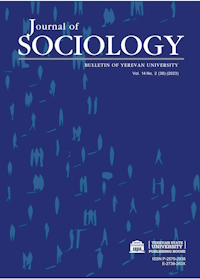Studying Breastfeeding Discourse in Armenia: A Sociological Insight
DOI:
https://doi.org/10.46991/BYSU:F/2023.14.2.107Keywords:
breastfeeding, discourse, Armenia, soviet legacy, Western values, Michel Foucault, childrearingAbstract
This paper discusses the role of the societal discourse in the construction of breastfeeding practices. It argues that societal discourse is crucial to the constitution of those practices, and that understanding the underlying circumstances of the breastfeeding situation anywhere in the world requires looking not only at the social reality itself but at the discourse that represents, reflects and constructs it. Proposing Armenia as a study case, the paper outlines the various sources of modern discursive practices around the feeding of children in Armenia, including pre-industrial customs, soviet political ideology, and modern Western values. Doing so, it proposes a new approach to studying breastfeeding practices through the prism of various discursive influences.
References
Binns, C., Lee, M., & Low, W. Y. (2016). The Long-Term Public Health Benefits of Breastfeeding. Asia Pacific Journal of Public Health, 28(1), 7–14. https://doi.org/10.1177/1010539515624964
Chakona, G. (2020). Social circumstances and cultural beliefs influence maternal nutrition, breastfeeding and child feeding practices in South Africa. Nutrition Journal, 19(1), 47. https://doi.org/10.1186/s12937-020-00566-4
Demirchyan, A. (1999). Identification of educational needs on breastfeeding among Armenian mothers and preparation of appropriate educational materials for them [American University of Armenia (AUA)]. https://dspace.aua.am/xmlui/handle/123456789/213
Demirchyan, A., & Melkom Melkomian, D. (2020). Main Barriers to Optimal Breastfeeding Practices in Armenia: A Qualitative Study. Journal of Human Lactation: Official Journal of International Lactation Consultant Association, 36(2), 318–327. https://doi.org/10.1177/0890334419858968
Foucault, M. (1998). The Will to Knowledge: The History of Sexuality Volume 1. (R. Hurley, Trans.). Penguin. (Original work published 1976)
Harutyunyan, S. (2015). WBTI Armenia assessment report. International Baby Food Action Network Asia. https://www.worldbreastfeedingtrends.org/ uploads/country-data/country-report/WBTi-Armenia-report-2015.pdf
Hekimian, K. M. (1994). Maternal and child health, family planning and breastfeeding in Armenia: A background desk review, assessment, and planning for Wellstart technical assistance. Wellstart International. https://pdf.usaid.gov/pdf_docs/PNABS364.pdf
Lalayan, Y. (1896). Family customs: Birth and baptism. Journal of Ethnography, A, 265–275.
Lalayan, Y. (1902). Birth and baptism. Journal of Ethnography, 9, 246–262.
Lee, R. (2018). Ethics and Politics of Breastfeeding: Power, Pleasure, Poetics. University of Toronto Press.
McKenna, J. J., Ball, H. L., & Gettler, L. T. (2007). Mother–infant cosleeping, breastfeeding and sudden infant death syndrome: What biological anthropology has discovered about normal infant sleep and pediatric sleep medicine. American Journal of Physical Anthropology, 134(S45), 133–161. https://doi.org/10.1002/ajpa.20736
Nsiah-Asamoah, C., Doku, D. T., & Agblorti, S. (2020). Mothers’ and Grandmothers’ misconceptions and socio-cultural factors as barriers to exclusive breastfeeding: A qualitative study involving Health Workers in two rural districts of Ghana. PloS One, 15(9), e0239278. https://doi.org/10.1371/journal.pone.0239278
Theurich, M. A., Davanzo, R., Busck-Rasmussen, M., Díaz-Gómez, N. M., Brennan, C., Kylberg, E., Bærug, A., McHugh, L., Weikert, C., Abraham, K., & Koletzko, B. (2019). Breastfeeding Rates and Programs in Europe: A Survey of 11 National Breastfeeding Committees and Representatives. Journal of Pediatric Gastroenterology and Nutrition, 68(3), 400–407. https://doi.org/10.1097/MPG.0000000000002234
UNICEF Data: Monitoring the situation of children and women. (2022, December 28). Breastfeeding. UNICEF DATA. https://data.unicef.org/resources/ dataset/breastfeeding/
Wagner, S., Kersuzan, C., Gojard, S., Tichit, C., Nicklaus, S., Thierry, X., Charles, M. A., Lioret, S., & de Lauzon-Guillain, B. (2019). Breastfeeding initiation and duration in France: The importance of intergenerational and previous maternal breastfeeding experiences - results from the nationwide ELFE study. Midwifery, 69, 67–75. https://doi.org/10.1016/j.midw. 2018.10.020
Wiessinger, D. (1996). Watch Your Language! Journal of Human Lactation, 12(1), 1–4. https://doi.org/10.1177/089033449601200102
Downloads
Published
Issue
Section
License
Copyright (c) 2023 Lilit Babayan

This work is licensed under a Creative Commons Attribution-NonCommercial 4.0 International License.





